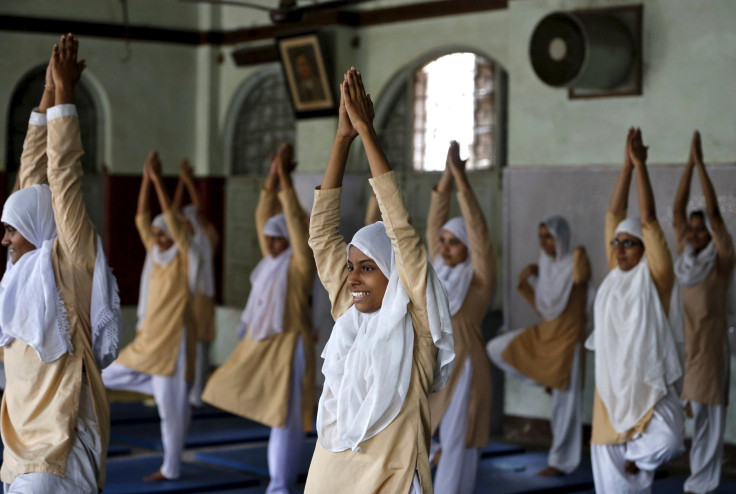International Yoga Day 2015: Hindu, Muslim Religious Controversy Plagues Indian Heritage Celebration

This Sunday will mark the first annual International Yoga Day, a modern celebration of the ancient Indian discipline spearheaded by India’s Prime Minister Narendra Modi. The event has been framed as a symbol of national pride, with some 35,000 people expected to take part in a yoga practice in the center of India’s capital and similar gatherings taking place across the globe.
But while government officials have promoted the event and yoga more broadly as a means of advancing Indian soft power across the world, members of minority religious groups within the country are disquieted by what they see as an attempt to impose Hindu religious practice on non-Hindus in India.
Some Muslim activist groups have criticized the upcoming event, arguing that they should not be compelled to chant “Om,” a sacred sound in Hinduism often chanted during yoga practices. Critics have also argued that the sun salutation used for some yoga practices violates the monotheistic nature of Islam.
"Chanting 'Om, hari om' — these are the words of Hinduism. Muslims cannot say these words," said Abdul Rahim Qureshi, the general secretary of the All India Muslim Personal Law Board, in comments reported by the Los Angeles Times. "This government is trying to impose Hindu culture and Hindu forms of worship on non-Hindus. This is not allowed by the constitution." Qureshi’s group has filed a suit against the government of India’s northern Rajasthan state, alleging that it was requiring students to attend yoga classes.
The president of a leading Muslim organization in the country has criticized a government order asking schools to remain open for the June 21 celebration, calling it dictatorial and impinging on citizens' rights. "We have nothing against those who worship the sun, the moon, the seas or the mountains,” said Maulana Mustaqeem Azmi, president of Jamiatul Ulema-e-Hind (Maharashtra), the Times of India reported. “But Muslims believe that all these things are creations of Allah, who alone deserves worship."
Government officials have addressed the controversy by assuring the public that participation in the celebration was optional and that neither sun salutations or “om” chants were part of the Yoga Day protocol. The event’s organizers also have countered that Yoga Day is more about national pride than religion. "Yoga has no religious connotation,” said Subodh Tiwari, joint director of the Kaivalyadhama Yoga Institute, the main organizer of events in Mumbai, the Los Angeles Times reported. “People like to make political statements that are not based on facts."
Despite these assurances, the response by certain right-wing Hindu politicians has only exacerbated the concerns of critics. One parliamentarian of Modi’s Hindu nationalist Bharatiya Janata Party made headlines after calling for Yoga Day critics to “drown in the sea.”
That the promotion of yoga is one of the signature campaigns of far-right Hindu nationalist groups like Rashtriya Swayamsevak Sangh is one of the main issues underpinning criticisms of the celebration. The group has made sun salutations and Sanskrit chanting part of its daily, military-style drills, the New York Times reported. They also have been vocal proponents of a Hindu nationalist agenda that has attempted to make Hindu religious texts required academic reading and banned the possession of beef in the western state of Maharashtra, citing the sacred nature of the cow in Hinduism.
Some Muslim leaders, however, have found a middle ground. Rafiq Ali, an administrator at a Muslim secondary school in Delhi, told Reuters that his school had introduced yoga in its curriculum, with at least 350 Muslim students taking part in lessons weekly. "We teach yoga but have excluded the prayers and Hindu chants," he said. "Why end the event with a Hindu prayer? The government can end it with the national anthem if they believe yoga belongs to India."
© Copyright IBTimes 2024. All rights reserved.






















